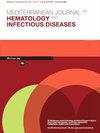CAR-T CELL THERAPY IN LARGE B CELL LYMPHOMA
IF 2
4区 医学
Q3 HEMATOLOGY
Mediterranean Journal of Hematology and Infectious Diseases
Pub Date : 2023-10-30
DOI:10.4084/mjhid.2023.066
引用次数: 0
Abstract
Large B-cell lymphomas (LBCLs) are among the most frequent (about 30%) non-Hodgkin’s lymphoma. Despite the aggressive behavior of these lymphomas, more than 60% of patients can be cured with first-line chemoimmunotherapy using the R-CHOP regimen. Patients with refractory or relapsing disease show a poor outcome even when treated with second-line therapies. CD19-targeted chimeric antigen receptor (CAR) T-cells are emerging as an efficacious second-line treatment strategy for patients with LBCL. Three CD19-CAR-T-cell products received FDA and EMA approval. The use of CAR-T cell therapy has also been explored for the treatment of high-risk LBCL patients in the first-line setting and for patients with central nervous system involvement. Although CD19-CAR-T therapy has transformed the care of refractory/relapsed LBCL, about 60% of these patients will ultimately progress or relapse following CD19-CAR-T: therefore, it is fundamental to identify predictive criteria of response to CAR-T therapy and to develop salvage therapies for patients relapsing after CD19-CAR-T therapies. Moreover, ongoing clinical trials are evaluating bispecific CAR-T cells targeting both CD19 and CD20 or CD19 and CD22 as a tool to improve the therapeutic efficacy and to reduce the number of refractory/relapsing patients.Car-t细胞治疗大b细胞淋巴瘤
大b细胞淋巴瘤(LBCLs)是最常见的非霍奇金淋巴瘤(约30%)。尽管这些淋巴瘤具有侵袭性,但超过60%的患者可以通过使用R-CHOP方案的一线化学免疫治疗治愈。难治性或复发性疾病患者即使接受二线治疗,预后也很差。
cd19靶向嵌合抗原受体(CAR) t细胞正在成为LBCL患者有效的二线治疗策略。三种cd19 - car - t细胞产品获得FDA和EMA批准。CAR-T细胞疗法也被用于一线高危LBCL患者和中枢神经系统受损伤患者的治疗。
尽管CD19-CAR-T治疗已经改变了难治性/复发性LBCL的治疗,但这些患者中约60%最终会在CD19-CAR-T治疗后进展或复发:因此,确定对CAR-T治疗反应的预测标准并为CD19-CAR-T治疗后复发的患者开发挽救性治疗是至关重要的。此外,正在进行的临床试验正在评估靶向CD19和CD20或CD19和CD22的双特异性CAR-T细胞作为提高治疗效果和减少难治性/复发患者数量的工具。
本文章由计算机程序翻译,如有差异,请以英文原文为准。
求助全文
约1分钟内获得全文
求助全文
来源期刊

Mediterranean Journal of Hematology and Infectious Diseases
Medicine-Hematology
CiteScore
4.20
自引率
6.20%
发文量
113
审稿时长
12 weeks
期刊介绍:
Reciprocal interdependence between infectious and hematologic diseases (malignant and non-malignant) is well known. This relationship is particularly evident in Mediterranean countries. Parasitosis as Malaria, Leishmaniosis, B Hookworms, Teniasis, very common in the southeast Mediterranean area, infect about a billion people and manifest prevalently with anemia so that they are usually diagnosed mostly by experienced hematologist on blood or bone marrow smear. On the other hand, infections are also a significant problem in patients affected by hematological malignancies. The blood is the primary vector of HIV infection, which otherwise manifest with symptoms related to a reduction in T lymphocytes. In turn, infections can favor the insurgency of hematological malignancies. The causative relationship between Epstein-Barr virus infection, Helicobacter pylori, hepatitis C virus, HIV and lymphoproliferative diseases is well known.
 求助内容:
求助内容: 应助结果提醒方式:
应助结果提醒方式:


